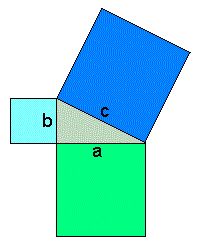|
 
|
| . |
|
|

|
|
Proving
the Pythagorean Theorem

|
|

|
|
3
Alec
awoke uncharacteristically late in the morning, feeling refreshed and
excited by what the day would hold. He jumped from bed and listened to his
phone messages. The first one, from his mother, expressed concern about a news report she heard about a "terrorist situation" at the café on the late news. |
She'd heard that "…no one had been injured due to the fast action of the anti-terrorist squad." Would he please call her first thing to let her know everything was OK?
Two more
messages were from Lenore and Jake. They had heard similar
reports in the local media. Would he call them soon too? The
last message was from Monty: "Forget the shenanigans last
night. I want to see you when you come in this afternoon on your
regular schedule. Stop by my office first thing."
Alec was
more excited than he could remember feeling for a long time. He was beginning to feel engaged in
something that was real and important. Quickly, he returned the
phone messages with new recorded messages, then dressed for
class that afternoon. If he hustled, he figured he would make it
there just before Dr. Catania charged into the room to begin
another assault on fuzzy thinking. But
Just before he could get onto Highway 12, the only route to the
college, traffic came to a fitful creep. Fifteen minutes later,
he was slowly passing a State Police checkpoint. Arriving late,
he ran down the long halls and then burst into the Ancient
Philosophy class.
|
|

"Well,
I will try and explain to you what figure is. What do you say to
this answer?—Figure is the only thing which always follows
color." Dr. Max was reading from a book as he paced
furiously across the room. The almost frenetic professor usually
paced back and forth and around the room as he lectured and
questioned. But as luck would have it, at this moment he was
heading directly toward Alec as he entered. "Mr.
Booner," Dr. Catania said with a dour owl face, "our
class starts promptly at two o'clock-every time. Please see me
in my office after class."
|

|
Socrates directs Meno's slave boy, Anytus, to construct squares on the sides of a right triangle. Then, Socrates leads the youth to deduce that the sum of (areas of) the two small squares equals (the area of) the large one. In algebraic terms, a2+b2=c2 where c is the hypotenuse while a and b are the legs of the triangle.
 |
|
"Oh yes, back to the Meno, wherein Socrates directs Meno's slave boy, Anytus, to demonstrate the Pythagorean Theorem," Dr. Catania fairly shouted as he spun like a solider on his heels. He resumed his fast-paced, interpretative reading in English and Alec quickly found a desk in the back of the room.
He sat, feeling like a mouse that must go unnoticed if it is to survive. Alec had intended to seek out Dr. Max after class. Now he had been summoned—not the best way to start, he thought glumly. |
|
Like
most students at Sundance, Alec knew of Dr. Max' reputation: the
mad doctor façade in the class room; a gentle and understanding
man outside of class. He had planned to talk to the professor
about…generally, without blabbing, some of the big questions
that he suddenly had about the ethics of promises to generals.
Then, if there was time, he hoped that Dr. Max might have some
pointers on the logic systems used in cryptography. Instead, it
looked like their after-class meeting was going to have a
different agenda. Alec slunk into a brown study for the rest of
the class, only reviving briefly for Plato's account of how an
unlettered slave boy came to discover the Pythagorean theorem—with only a bit of coaching from Socrates. |
|
|